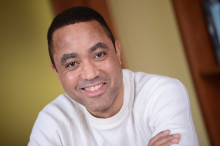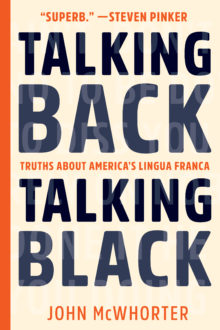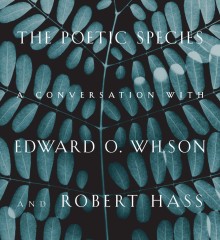Welcome to the BLP Conversations series, featuring dialogues between people whose lifework, like BLP’s mission, explores the creative territory at the intersection of the arts and sciences, and has become a testament to how science and the humanities can join forces to educate and inspire. This online series is inspired by E.O. Wilson and Robert Hass, whose talk about the connections between science and the arts was published in our book The Poetic Species: A Conversation with Edward O. Wilson and Robert Hass.

In this conversation, John McWhorter, linguist and author of Talking Back, Talking Black, and Kia Corthron, playwright and author of the Center for Fiction’s First Novel Prize–winning The Castle Cross the Magnet Carter, discuss what makes a language “standard,” cultural acceptance of Black English and Black American Sign Language, and accents in literary dialogue, in life, and in the movies. This conversation is part of the BLP Conversations series from Bellevue Literary Press, featuring dialogues that explore the creative territory at the intersection of the arts and sciences.
Kia Corthron: John, your book inspired for me such an admiration of your profession! My work is all about language, yet I never examine it under such a fascinating (and often humorous) microscope.
I really appreciated that Talking Back, Talking Black is not about judgment or condescension toward those who are reluctant about or hostile toward any defense of Black English—that you aren’t just pulling the race card to shut up the inquirer—but the book, on the contrary, is an honest attempt to help interested readers understand why Black English is not incorrect English but rather alternative English.
I was instantly intrigued by your opening assertions that in Haiti there’s a language called Creole in addition to standard French and in Sicily there’s a language called Sicilian in addition to standard Italian. Compared to the controversies always surrounding the legitimacy of Black English in the U.S., are these Haitian and Italian alternatives to the standard language accepted, or more accepted, as legitimate language alternatives by local standard language speakers? Or is it that we as American outsiders accept them more so than do standard speakers within their own borders?
In Haiti, where the native tongue of most speakers is Creole, should Creole be more correctly considered “standard Haitian”? Or is “standard” always defined by, as you wrote, the language of “print, school, and the media”?
John McWhorter: Nonstandard languages are accepted or reviled to differing extents from place to place. In Italy, for many people there is a way to talk at home and in casual situations that would certainly have no place in, and be too “low for,” formal situations but is thought of warmly otherwise as part of local identity. In Jamaica, the opinion of patois is about the same as the opinion of Black English here; there is a certain affection in the corners of the general consciousness, but overall it’s considered “bad grammar.” Haitian is in between: Haitian speakers don’t think of themselves as speaking “bad French,” and I have heard anecdotally that poor Haitians spontaneously imagine Adam and Eve speaking Creole, not French. But as the language used in writing, French is seen as “higher” and more of a “real language.”
Unfortunately, it’s safe to say that when people are aware of writing, there is a sense that a language isn’t truly a “language” unless it’s written down. One of the things that most frustrates a linguist is this idea that anything not written is a “dialect.” More often than not, unwritten languages are much more grammatically complicated than ones that are written, because written languages have usually been imposed at some historical point on conquered adults who, as adults, cannot learn languages perfectly and thus streamline them. English is like that, as is French, Persian, and so on.
Kia, The Castle Cross the Magnet Carter is quite the tapestry, and the characters have been ringing in my head ever since I finished the book. I enjoyed how faithfully you transcribed actual casual speech patterns of characters both white and black, right down to when they thought to themselves.
You correctly indicate that there is a whole lot in common between white and black speech, and your ear is incredible. Though, here is a factoid: today, black people leave out the be verb in sentences like “She de only one,” but white southerners, even the poorest and least educated, do not.
For the first fifty pages of your book, I must admit I had a hard time keeping in my mind that Roof and his family were white, because they drop their be’s just like black people. To my linguist’s eye, the be-dropping immediately signals “black,” and yet that wasn’t the case with your characters.
But whites used to drop their be’s in the South; academic documentation has shown that the ones born after World War II stopped dropping their be’s. So your depiction is precisely right. Were you by chance picking up on that little historical detail?
KC: In 1941, Dwight Campbell, one of my black protagonists, has a poor white friend named Roof (short for Rufus) Barton who lives up the street. Their town, Humble, Maryland, is a fictionalization of my hometown and my mother’s hometown: Cumberland, Maryland. The design of the Campbell home is almost identical to the one where I grew up, and up the street lived a poor white family, parents and five kids, whom my sister Kim and I played with; I loosely patterned the Barton family after them. But 1941 would have been my mother’s generation. So, in answer to your question about white English pre-WWII—I may have just gotten lucky! Or I possibly may have carried some memory of the way the parents of those kids spoke. Or maybe it was all Cumberland-isms. At any rate, I’m not a linguist—and I was vaguely nervous that you might analyze what I’d written!
Castle Cross is my first novel, but I’ve been writing plays a long time—dialogue. An amusing anecdote (though I wasn’t laughing then): A mainstream Connecticut theater with an affluent audience produced a play of mine many years ago and invited audience members to respond in writing. One person wrote—I think I can just about quote it verbatim:
“This isn’t the way Black English sounds. I know people who speak Black English. This doesn’t sound like them.”
My Black English she was criticizing! (Given the demographics of that audience, I’m assuming the respondent was white.) However, the audience member may have had a point. I write language as I hear it in my head, and I also play around with language, especially for the stage when an audience’s ear can be more readily enticed by the quirky and surprising than by the mundane and expected. I wonder that, for some white theatergoers and fiction readers, creative language by white writers is deemed poetic, while creative language by writers of color is pegged inauthentic. At any rate, whatever I wrote had its foundation primarily in the Appalachian Maryland working-class Black (and white, as the town predominantly was) English of my formative years, peppered with the Harlem of my adulthood.
JM: Ah yes, people’s conceptions of vernacular speech, especially when it’s their own, can diverge so much from the reality.
The educated white person has often internalized a sense that it’s wrong to associate black people and “bad grammar” at all. There’s a dissonance that person permits, which is to read southern white speech depicted in all of its glory and accept that as “the way they talk,” but to bristle at black people depicted speaking the same way. Human minds tolerate a lot of dissonance of that kind!
KC: B.J., the older white brother in my novel, is deaf. I wondered how you responded to the pages where I incorporated research I’d done on the origins of American Sign Language. The Oralist movement (the height of which being the late 19th century through early decades of the 20th), which forbade sign language and demanded that deaf students speak, was pervasive in white deaf schools but nearly nonexistent in black deaf schools. So by the time ASL developed in the ’70s, it was the black sign language that had the historical uninterrupted tradition, but it was white sign language that became standard. Many scholars have suggested that black sign language should have become the standard. Do you agree?
JM: That is a very rich question. Some would say that it would have been more representative of the origins of ASL to use the more faithfully transmitted version (BASL). However, usually a form that is understood and producible by the most people is chosen for the standard, and since BASL speakers had to be bidialectal in ASL, one could argue that that was grounds for ASL winning out.
But in any case, we need not wonder why ASL won out: BASL was spoken by black people and therefore deemed “other” and lesser.
A major plus of your novel is that the way you depict the whole issue of signing and deaf culture is so sensitive and comprehensive that it should serve as an introduction to the issue for anyone interested. The whole relationship between B.J. and April and the life they build together is the most vivid depiction of deaf life and signing I have ever encountered, including nuances such as B.J.’s signing being somewhat unusual because of the way he learned it as the sole deaf member of his family where they made up a lot of their own signs, the inclusion of there even being a black sign language, and in general the depiction of deaf life as, simply, a life, rather than as people living with a “handicap.”
What got you interested in sign language? It’s easy to imagine a Castle Cross where there did not happen to be deaf people, but that aspect makes it all the richer.
KC: My mother had seven siblings. The oldest, my Aunt Cleta, who lived just over the border in West Virginia, was also my mother’s closest friend. Thus we were very close to Aunt Cleta’s four kids, the youngest being deaf. Much of B.J.’s youth is inspired by memories with my cousin, though we went our separate ways in adulthood; B.J.’s adulthood is complete fiction. I didn’t set out to write about my cousin, but growing up playing with him must have been what inspired me to create a deaf character. The Deaf culture stuff (when referring to the culture, “deaf” is capitalized) came from a lot of book research and a sign language course I took. I was very fortunate through contacts to find a deaf reader: Florida-based Iris Kinley, who generously read an entire draft (which was even 20% longer then!) and gave me feedback. She’s brilliant, and now we are great friends.
JM: A good while ago I had occasion to do a study of old black Indianapolis, and it was neat to see aspects of it referred to/dramatized in the book. What led you to take Eliot to Indianapolis in particular, and how did you study up on black Indy history?
KC: I wanted to set that section of the book in a midwestern city, but I wanted to go more off the beaten path than, say, Chicago. Indianapolis came to me, and I was fortunate to find a book in the New York Public Library that focused on black Indiana in the period I was exploring. Though I’d wanted to make a visit early on, the book had finally found a publisher and was a “go” before I finally financed a short trip to Indy. My trek was brief, but I learned so much in that time! Perhaps most striking was the rich black cultural history focused around “the Avenue”—Indiana Avenue and the (Madame C.J.) Walker Theatre.
It took a courageous conviction on your part to present uncomfortable documented truth in the chapter addressing minstrelsy—for you to clarify that the language of black people presented in white minstrelsy was not wholly fiction but rather a (mean-spirited) exaggeration of the black dialect from the antebellum era. In a contemporary context—say, a film such as 12 Years a Slave—the storytelling is brutally honest, while the language presumably is not, probably both because the screenwriter was not a linguist and because of the concern that 21st-century moviegoers would be skeptical and/or turned off by accurate period Black English. Is this incongruence a little like nails on a chalkboard to you (speaking of period references)? Or perhaps it’s admissible in the same way that we accept that the characters in Amadeus are speaking German while hearing it in standard American English?
JM: I do not bristle at all to hear black people depicted in historical movies talking the way they do now. If you are trying to make a dramatic statement, you have to have people speaking in a relatable way. When Daniel Day-Lewis ventured a constructed 19th-century working-class accent for Gangs of New York, it was good for ad copy, but in reality, it was just weird. None of the other actors did it, and so he just sounded odd—and if the rest of them had done it, it would have made for a movie where we would have processed the characters as foreign.
I think dramatic depictions, to be appropriately dramatic, should take it light on reproducing the old accents. This is in line with my fierce adherence to the idea that Shakespeare should be adjusted to Modern English and that opera should be performed in the language of its hearers. With the latter, the issue is brute comprehension; with the accent business, it’s comprehension of a different kind but in the end the same.
I just want us to know that black speech has always changed in ways that would challenge the modern hearer, in the same way that standard English has. Because that’s how language works.
John McWhorter teaches linguistics, Western civilization, music history, and American studies at Columbia University. A New York Times best-selling author and TED speaker, he is a columnist for Time and regular contributor to the Atlantic, Wall Street Journal, and Washington Post. His books on language include The Power of Babel, Our Magnificent Bastard Tongue, What Language Is, The Language Hoax, Words on the Move, and Talking Back, Talking Black.
Kia Corthron’s debut, The Castle Cross the Magnet Carter, is the winner of the Center for Fiction’s First Novel Prize. Corthron is also a playwright, and her body of work has garnered the Windham Campbell Prize for Drama and other awards. She is the 2017 featured playwright at Chicago’s Eclipse Theatre Company, which will produce three of her plays. She has also written for television (The Jury, The Wire).
*This BLP Conversations series installment also appeared at the Literary Hub




